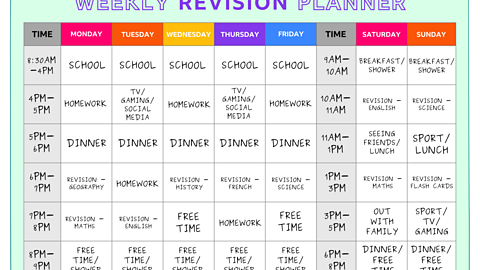When trying to manage your time, it is essential to make a timetable. It helps keep you organised and makes sure you have enough time for the important things. This is one of the first steps towards better time management!

Why do you need to make a timetable?
Making a timetable is extremely important. It helps give you a clear idea of the tasks you need to do, and the amount of time you need to spend doing each task. I found making a timetable invaluable, especially for studies. Having a clear idea of the subjects I was studying each day massively helped me during my 11th and 12th grade (5th and 6th year in Ireland). I would make a study plan/timetable for each week. This helped me keep on top of things.
Additionally, making a clear structure forces you to do the tasks/subjects you don’t want to do. Let’s face, we find it much more convenient to say “I’ll do this tomorrow” than actually sitting down and writing out a 7 page essay. It’s easy. But, it’s not helpful. Therefore, having a well created timetable will help you fight the never ending procrastination.
Steps for making a timetable
The following are the steps I take when I prepare a timetable for the week. I like to make a timetable each week. Doesn’t have to be too complicated. Hopefully the following steps make this seemingly daunting task a little easier.
1. Make a to-do list of your day/week:
Making a list of all the things you need to do in the day/week is really helpful as that will ensure you don’t forget anything important. I like to use the notes app to do this. Just literally list out the things you need to do, as they come to your mind.
An advantage of making a to-do list is that, sub-consciously you are aware that work needs to be done, so your mind will be thinking of ways to do this work in the best way possible.
Now you know what needs to be done. This is the first step to making a schedule/plan/timetable for yourself.

2. Prioritize the work on this list:
Now that you have created a list of your work, prioritise this list from most important to least important. Re-write this list, with the work that is most important at the first (meaning this work should be done first).
How to decide what’s important?
- See whether there is a specific date, by when this task must be done. Example – A project that is due tomorrow, must be near the top of your list
- Prioritize your goals. Always make time to achieve your goals. Setting goals are really important to stay driven and motivated.
If your stuck trying to set goals, here’s a guide on how to set goals
Another strategy, and the one I used, is putting the tougher tasks first. This way, you can get the tough stuff done when your mind is still fresh. (obviosuly, if something is due tomorrow, do that first)
On weekends, I always had math on my study to-do list. It’s one of the most important subjects after all. Math would always be the subject I studied first, because it’s the toughest. I would get in a good few hours, and then after a nice break, I would study other subjects. When you leave the tougher tasks for ‘later’, inevitably, that ‘later’ never comes. Get it out of your way, and you can then move onto the tasks/subjects you like. Luckily for me, I enjoy math, so it was a win-win.

3. Create the outline of your timetable:
This means make a timetable and leave gaps, so you can fill out what the tasks you will be doing in the day/week.
you can either make the outline yourself, or just download it from the web. The outline has to be something like your school timetable’s outline. Like this one:

Now that you have the everything ready, lets start arranging work into these spaces!
4. Allocate time to each task appropriately:
This is an important step, as you need to know how much time must be spent on each task. This way you can successfully get everything done. For example, if you want to study math on a Saturday morning, have a rough idea of the chapters/areas you’d like to get done. Maybe you want to study Algebra. Get a rough approximate of the areas of Algebra you want to do, and plan accordingly.

5. Arrange the tasks:
By now you should’ve ordered your tasks, with the most important at first. Now put them into the timetable. If a task is too time-consuming, try to put it at the top, so you can get it done without the added pressure.
Additional tip: in your timetable, make sure to include breaks and fun-times. Doing so will keep you motivated and you will enjoy your days more thoroughly.

Your timetable is complete!
But, now the real challenge begins…
Actually sticking to it. At first, you may feel overwhelmed, but trust me, this is for the best in the long run. Having a timetable helps you hone in on the important tasks, and ensures you don’t leave anything out. Or even worse, it ensures you don’t miss an assignment or deadline. This is one of the first steps for a better time management.
All the best!
Post Disclaimer
The information contained in this post is for general information purposes only. The information is provided by How to Make a Timetable and while we endeavour to keep the information up to date and correct, we make no representations or warranties of any kind, express or implied, about the completeness, accuracy, reliability, suitability or availability with respect to the website or the information, products, services, or related graphics contained on the post for any purpose.



